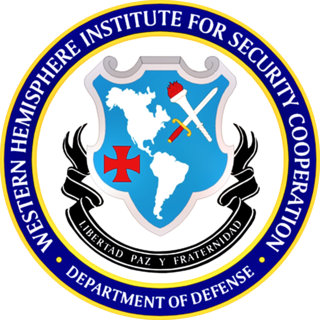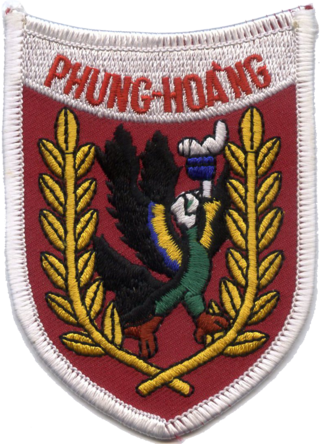
The Western Hemisphere Institute for Security Cooperation (WHINSEC), formerly known as the School of the Americas, is a United States Department of Defense school located at Fort Moore in Columbus, Georgia, renamed in the 2001 National Defense Authorization Act.

Counterintelligence (counter-intelligence) or counterespionage (counter-espionage) is any activity aimed at protecting an agency's intelligence program from an opposition's intelligence service. It includes gathering information and conducting activities to prevent espionage, sabotage, assassinations or other intelligence activities conducted by, for, or on behalf of foreign powers, organizations or persons.

A low-intensity conflict (LIC) is a military conflict, usually localised, between two or more state or non-state groups which is below the intensity of conventional war. It involves the state's use of military forces applied selectively and with restraint to enforce compliance with its policies or objectives.

Unconventional warfare (UW) is broadly defined as "military and quasi-military operations other than conventional warfare" and may use covert forces, subversion, or guerrilla warfare. This is typically done to avoid escalation into conventional warfare as well as international conventions.

An insurgency is a violent, armed rebellion by small, lightly armed bands who practice guerrilla warfare from primarily rural base areas against a larger authority. The key descriptive feature of insurgency is its asymmetric nature: small irregular forces face a large, well-equipped, regular military force state adversary. Due to this asymmetry, insurgents avoid large-scale direct battles, opting instead to blend in with the civilian population where they gradually expand territorial control and military forces. Insurgency frequently hinges on control of and collaboration with local populations.

The Phoenix Program was designed and initially coordinated by the United States Central Intelligence Agency (CIA) during the Vietnam War, involving the American, Australian, and South Vietnamese militaries. In 1969, CIA responsibility was phased out, and the program was put under the authority of the Civil Operations and Revolutionary Development Support (CORDS).

Carlos Manuel Arana Osorio was President of Guatemala from 1970 to 1974. His government enforced torture, disappearances and killings against political and military adversaries, as well as common criminals.

Julio César Méndez Montenegro was the President of Guatemala from July 1, 1966 to July 1, 1970. Mendez was elected on a platform promising democratic reforms and the curtailment of military power. The only civilian to occupy Guatemala's presidency during the long period of military rule between 1954 and 1986. Mendez had assumed the presidency under a pact in July 1966 that gave the armed forces carte blanche with respect to internal security matters and an effective veto over governmental policy. Nevertheless, his election and swearing in was considered a major turning point for the long military-led Guatemala. He was the first cousin of César Montenegro Paniagua whose kidnapping, torture and murder during the Julio César Méndez presidency is rumored to have been undertaken with presidential sanction.

Counterinsurgency is "the totality of actions aimed at defeating irregular forces". The Oxford English Dictionary defines counterinsurgency as any "military or political action taken against the activities of guerrillas or revolutionaries" and can be considered war by a state against a non-state adversary. Insurgency and counterinsurgency campaigns have been waged since ancient history. However, modern thinking on counterinsurgency was developed during decolonization. Within the military sciences, counterinsurgency is one of the main operational approaches of irregular warfare.

The Guatemalan Civil War was a civil war in Guatemala fought from 1960 to 1996 between the government of Guatemala and various leftist rebel groups. The government forces have been condemned for committing genocide against the Maya population of Guatemala during the civil war and for widespread human rights violations against civilians. The context of the struggle was based on longstanding issues of unfair land distribution. Wealthy Guatemalans, mainly European-descended, and foreign companies such as the American United Fruit Company had dominated control over much of the land, and paid almost zero taxes in return – leading to conflicts with the rural indigenous poor who worked the land under miserable terms.
Psychological Operations in Guerrilla Warfare was a manual written by the Central Intelligence Agency (CIA) for the Nicaraguan Contras, who were involved in a civil war with the Nicaraguan government. It was revealed by the Associated Press on October 15, 1984. The ninety-page book of instructions focused mainly on how "Armed Propaganda Teams" could build political support in Nicaragua for the Contra cause through deceit, intimidation, and violence. The manual also discussed assassinations. The International Court of Justice case Nicaragua v. United States found that the publication of this manual had "encouraged acts ... contrary to general principles of humanitarian law." However, the CIA claimed that the purpose of the manual was to "moderate" the extreme violence already being used by the Contras.

The relationship between Colombia and the United States evolved from a mutual cordiality during the 19th and early 20th centuries to a recent partnership that links the governments of both nations around several key issues; this includes fighting communism, the War on Drugs, and the threat of terrorism due to the September 11 attacks in 2001. During the last fifty years, different American governments and their representatives have become involved in Colombian affairs through the implementation of policies concerned with the issues already stated. Some critics of current US policies in Colombia, such as Law Professor John Barry, claim that US influences have catalyzed internal conflicts and substantially expanded the scope and nature of human rights abuses in Colombia. Supporters, such as Under Secretary of State Marc Grossman, defend the idea that the United States has promoted respect for human rights and the rule of law in Colombia; in addition, adding to the fight against drugs and terrorism.
The U.S. Army and CIA interrogation manuals are seven controversial military training manuals which were declassified by the Pentagon in 1996. In 1997, two additional CIA manuals were declassified in response to a Freedom of Information Act (FOIA) request filed by The Baltimore Sun. The manuals in question have been referred to by various media sources as the "torture manuals".
Operation Charly, was allegedly the code-name given to a program during the 1970s and 1980s undertaken by the junta in Argentina with the objective of providing military and counterinsurgency assistance to right-wing dictatorships and insurgents in Central America. According to Noam Chomsky, the operation was either headed by the Argentine military with the agreement of the United States Department of Defense, or was led by the US and used the Argentinians as a proxy.

Foreign internal defense (FID) is a term used by the military in several countries, including the United States, France, and the United Kingdom, to describe an integrated, or multi-country approach to combating actual or threatened insurgency in a foreign state. This foreign state is known as the Host Nation (HN) under the US doctrine. The term counter-insurgency is commonly used for FID.
A clandestine cell system is a method for organizing a group of people, such as resistance fighters, sleeper agents, mobsters, or terrorists, to make it harder for the police or military to catch them. In a cell structure, each of the small groups of people in the cell know the identities of the people only in their own cell. Thus any cell member who is apprehended and interrogated will not likely know the identities of the higher-ranking individuals in the organization.
This article deals with the activities of the Central Intelligence Agency (CIA) of the federal government of the United States that are violations of human rights.
The U.S. Central Intelligence Agency (CIA) has a history of interference in the government of Guatemala over the course of several decades. Guatemala is bordered by the North Pacific Ocean and the Gulf of Honduras. The four bordering countries are Mexico, El Salvador, Honduras and Belize. Due to the proximity of Guatemala to the United States, the fear of the Soviet Union creating a beachhead in Guatemala created panic in the United States government during the Cold War. The CIA undertook Operation PBSuccess to overthrow the democratically elected Jacobo Árbenz in the 1954 Guatemalan coup d'état. Carlos Castillo Armas replaced him as a military dictator. Guatemala was subsequently ruled by a series of military dictatorships for decades. Between 1962 and 1996, Left-wing guerrillas fought the U.S. backed military governments during the Guatemalan Civil War.
In United States military doctrine, unconventional warfare is one of the core activities of irregular warfare. Unconventional warfare is essentially support provided by the military to a foreign insurgency or resistance. The legal definition of UW is:
Unconventional Warfare consists of activities conducted to enable a resistance movement or insurgency to coerce, disrupt or overthrow an occupying power or government by operating through or with an underground, auxiliary or guerrilla force in a denied area.
The United States has at various times in recent history provided support to terrorist and paramilitary organizations around the world. It has also provided assistance to numerous authoritarian regimes that have used state terrorism as a tool of repression.














